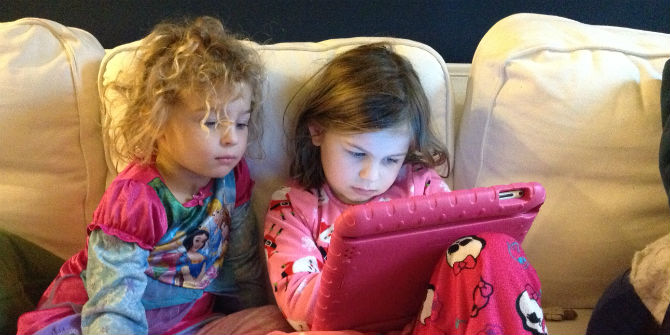 With children growing up in ever-changing conditions in the digital age, digital parenting becomes more crucial than ever before. The predominant focus for parents, policy-makers, and researchers has long been on minimizing the risk of harm. Yet the swift transition to children’s online learning during lockdown caught many off guard. Children from disadvantaged families struggle to get online due to a lack of device or internet connectivity. Safety issues such as online child pornography are also in the spotlight. For www.parenting.digital, Dongmiao Zhang and Sonia Livingstone discuss the difficulties of digital parenting and how to close the digital divide by supporting less-educated parents and those from lower socio-economic status households.
With children growing up in ever-changing conditions in the digital age, digital parenting becomes more crucial than ever before. The predominant focus for parents, policy-makers, and researchers has long been on minimizing the risk of harm. Yet the swift transition to children’s online learning during lockdown caught many off guard. Children from disadvantaged families struggle to get online due to a lack of device or internet connectivity. Safety issues such as online child pornography are also in the spotlight. For www.parenting.digital, Dongmiao Zhang and Sonia Livingstone discuss the difficulties of digital parenting and how to close the digital divide by supporting less-educated parents and those from lower socio-economic status households.
This reflects the reality of digital parenting today. For a long time, parents have been receiving fundamentally contradictory advice on limiting screen time yet optimizing their child’s online opportunities. Uncertainties about the digital future further add to parents’ anxieties. We know very little about how parents embrace technologies, get connected, and help their children maximize digital opportunities while staying safe. What is the art of being a parent in a digital present? How should they approach the inherently innovative yet potentially disruptive practice of online learning? There are no easy answers to such questions.
It should come as no surprise that parents navigate through today’s digital transition in different ways. Online privacy remains a top concern for many parents. They face a difficult balance between checking on their children online and encouraging their independence. Although parents generally agree that their child is ready to use the internet independently when turning 13, parents of teens think 13 is too early. With varied levels of digital skills, parents also engage in a range of enabling and restrictive strategies. Our previous research shows an unsurprising yet deeply problematic digital divide: parents with higher socioeconomic status and level of education provide more forms of online support to their children.
These research findings offer robust evidence on parents’ hopes and fears about technology and how it might shape their children’s future. There has been much literature around limiting screen time, yet still our understanding of how parents positively support their child’s e-learning remains limited. We ask here: which parents are more likely to take steps to support their child’s e-learning? What factors make a difference? How does parental mediation of e-learning compare with parental mediation of online risk?
To answer these questions, we summarise the findings of our new report, the fifth in a series from our nationally representative survey of 2,032 UK parents of children aged 0-17 conducted in late 2017 before the current pandemic. We found that:
- Support for e-learning is distributed unevenly across children, depending on their family background. Educated parents and those of higher social economic status report undertaking more internet-related activities designed to support the e-learning of their child.
- However, parental digital skills and attitudes also matter. Parents with better digital skills and more positive views about technology and the benefits it can bring their child also do more to support their child’s e-learning.
- The research found an interesting link between online opportunities and risks. Parents who do more to support their child’s e-learning worry more about online risks, but they also tend to do less risk mediation.
- In addition, the characteristics of the child matter. Younger children and those who use more devices receive more support. There is no observed difference for girls and boys, neither does the child’s frequency of internet use matter.
The findings highlight the tricky choices that parents face between supporting the opportunities or managing the risks of the digital age. Parents may decide to engage in e-learning support as they deem the benefits outweigh the risks. Mediation of online risks may also be a burden, or disincentive for some, as surely parents would like to support e-learning without having to take on more risk management. Whether there can be better advice and support offered to them, or whether the way forward lies more in stronger internet regulation or in overcoming problematic service design to meets the needs of children and families, remains a live matter for debate.
Our research suggests that closing the digital divide may require more than just offering devices and connectivity for those at risk of being left behind. Much more could be done by targeting guidance and resources to less-educated parents and those from lower socio-economic status households. It could also be effective to develop interventions that seek to build digital skills, especially among less-privileged parents. There’s also scope for social campaigns and policy interventions to shape parental attitudes towards technology, encouraging parents to offer more digital support for their child. Schools have a role to play here, but they too are struggling with the sudden shift to online education.
As we argue in Parenting for a Digital Future, parents are often more willing to play their role than society gives them credit for. But they are also often in need of more guidance and encouragement than society provides.
For more detail and discussion, read the full report.
First published at www.parenting.digital, this post gives the views of the authors and does not represent the position of the LSE Parenting for a Digital Future blog, nor of the London School of Economics and Political Science.
You are free to republish the text of this article under Creative Commons licence crediting www.parenting.digital and the author of the piece. Please note that images are not included in this blanket licence.
Image credit: Photo by cottonbro on Pexels





